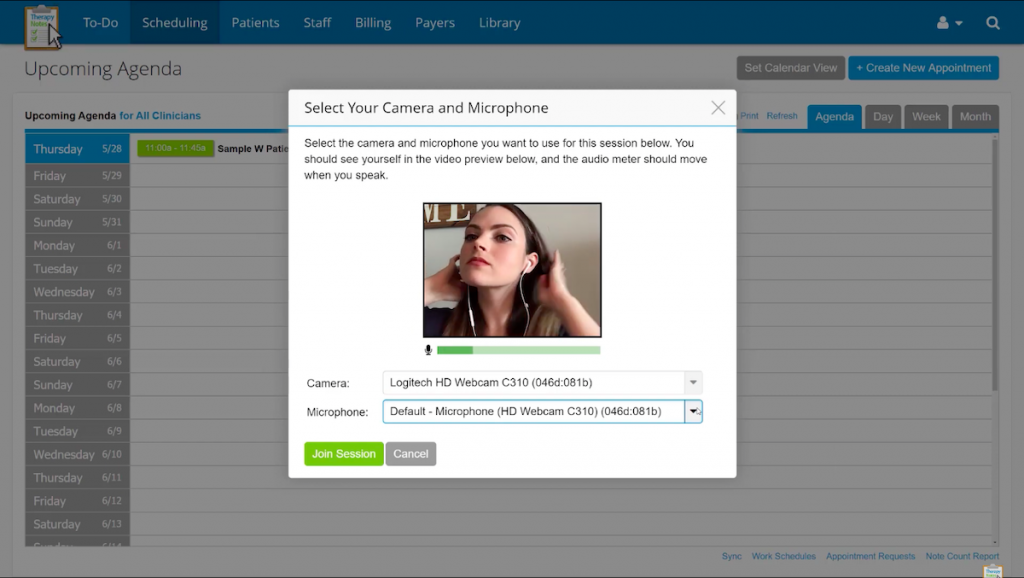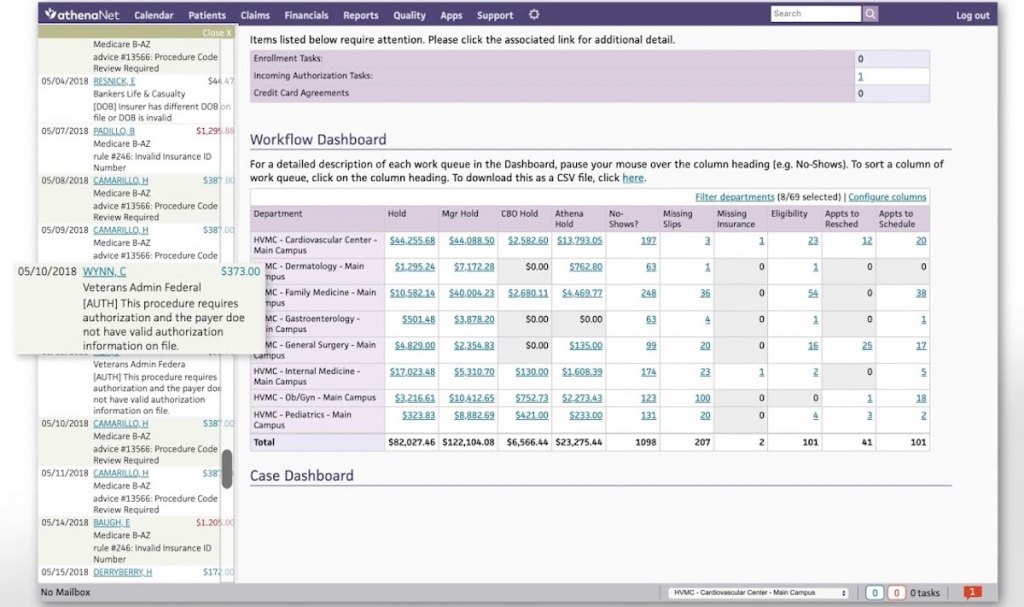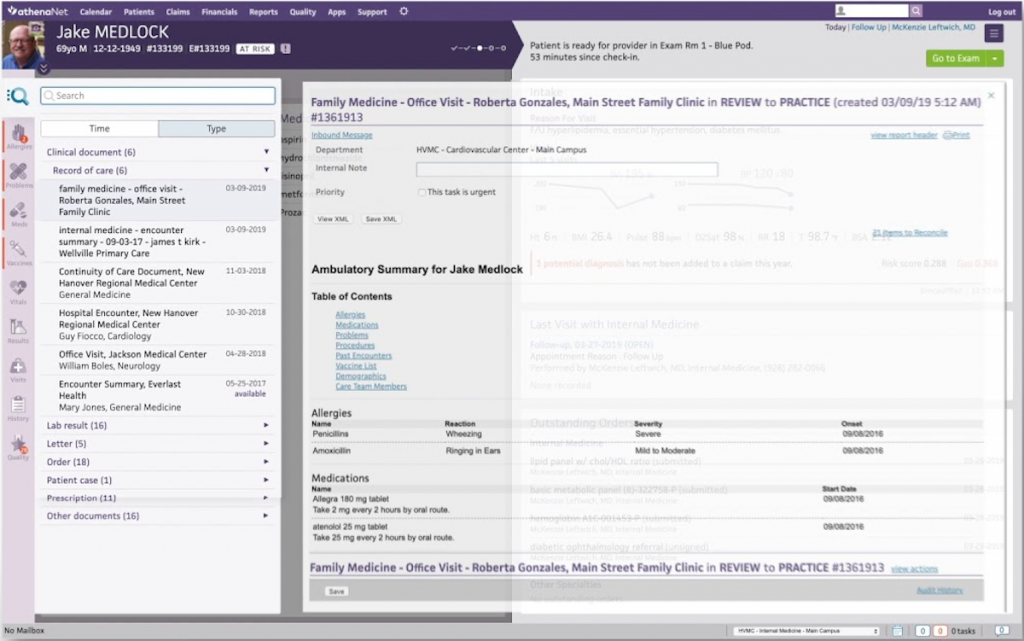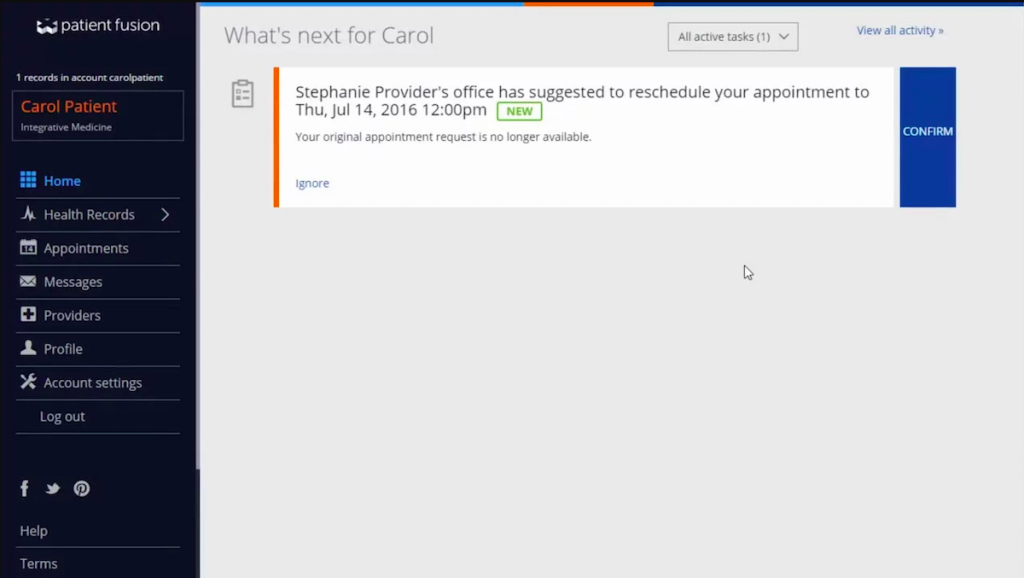A recent study conducted by the American Medical Association (AMA) and Mathematica, a research and consulting organization, revealed that rising administrative burdens are some of the biggest threats faced by physicians in private practice. According to AMA, private practice physicians have to spend 10% of their time on admin work, which can get overwhelming to the point where they would sell their practice instead to hospital systems.
This leads us to examine one of the technologies healthcare systems use to streamline their daily administrative processes—medical practice management software.
In this article, we explore: What is medical practice management software? How does this software work? What are its benefits and potential issues? and what to look for before you purchase one, including the cost? We also share some of the best medical practice management solutions that you can look further into before you explore other potential options.

Detailed Guide to Medical Practice Management Software
What is Medical Practice Management Software?
So what is medical practice management software? Medical practice management software, or PMS, is a type of healthcare software designed to streamline time-consuming administrative processes in the operations of healthcare institutions, such as hospitals, clinics, etc. These processes include collecting and organizing patient data, scheduling appointments, gathering insurance details, performing billing, and generating reports. They are closely related to electronic health records (EHR), making it essential to know how EMR differs from EHR.
This technology plays a crucial role in automating tedious manual tasks and improving the efficiency of a medical facility’s operations or private physicians’ productivity while running their own practice. With the right medical practice management system at their disposal, they will not only free themselves from the burden of admin workloads, but they will also have more time to dedicate to providing the best service to their patients.
PMS systems also help make it easier for patients to access their updated medical records, such as their medical history, allergies, medications, etc. Furthermore, having a good PMS solution in place and integrating it with other software systems greatly improves the accuracy of data being recorded and shared, which people have been more supportive of after the pandemic.
Types of Data-sharing Adults Are More Likely to Support Post-pandemic
Source: The Pew Charitable Trusts
Designed byTypes of Medical Practice Management Software
Medical practice management systems can be categorized according to software deployment:
- Desktop PMS. This is the on-premise version of medical practice management software, which is designed to be used by a single or multiple users in one location. This type of PMS is ideal for small medical facilities like clinics that have a fewer number of staff members and patients. This is also great for private practice physicians who handle their own appointment scheduling, patient records, billing, etc. But while desktop PMS works well to enhance the productivity and efficiency of small practices and facilities, it has limitations, especially when it comes to accessibility and flexibility. And because you can only use this PMS on the desktop computer where it is installed, it will not be as beneficial to practices and facilities that conduct remote work, especially to those that need real-time access to medical data and records.
- Client Server PMS. Unlike desktop PMS, this type of medical practice management software allows a facility to create a network of multiple computers by installing a PMS in an on-site server. While this gives more room for productivity because medical staff can simultaneously utilize the PMS, offsite medical personnel will still not be able to do so.
- Web-based PMS. This category consists of some of the best medical practice management software, especially in terms of flexibility, ease of use, and affordability. Just like other cloud-based platforms, web-based PMS is accessible from anywhere as long as you have a good internet connection. This kind of setup is ideal for physicians and medical facilities that operate both onsite, offsite, and in multiple locations. And because the software is hosted by a service provider, it usually requires zero maintenance and updates on the end of the user, which lowers not only the cost but also the efforts required for keeping the software updated.
- Mobile-based PMS. This type of PMS functions similarly to its cloud-based counterpart but is designed with an interface optimized for mobile devices like smartphones and tablets. Mobile PMS can come with nifty features, such as instant data capture, which requires access to your device’s features, such as camera, storage, etc.

Telehealth session on TherapyNotes
Features of a Medical Practice Management Software
Different PMS solutions may offer different sets of tools, especially when the software caters to a particular medical specialty. There, however, are key features that you need to keep an eye on if you are looking for a good medical practice management platform. Below are some of them:
Customizable user roles and access
This feature allows administrators to define user roles and control their access to functions and information stored in the system. Having this feature reinforces security as it allows you to put specific access restrictions in place.
Scheduling
This function seen in dedicated appointment scheduling platforms is another core feature that a good PMS must have as this starts the ball rolling in optimizing a medical facility or practice’s operations. While this is primarily used by the staff, there are also PMS solutions that allow patients to schedule their own appointments online. Pre-visit intake forms are also provided for the patients to fill out online, which saves them time during their appointment visits.
Automated reminders
This feature automatically sends reminders to patients if they have an appointment coming up or if there are changes in their scheduled appointments.
Insurance verification and claims processing tools
This feature streamlines the process of insurance eligibility and medical benefits checks. Furthermore, this feature of a medical practice management system helps keep track of insurance claims, especially the ones submitted electronically.
Reporting capabilities
Another key feature of PMS software is reporting. This enables you to automatically generate detailed reports on a patient’s medical and financial history or practice or facility’s financial performance. This feature usually provides users with pre-set reporting tools and templates as well as the capability to customize various parameters.
Document management
PMS systems play a crucial role in centralizing the storage, monitoring, and updating of pertinent records such as patient documents. This also often comes with a document search function to make it easier to find specific records.
Billing and payment processing
Medical billing can be complicated as it involves different factors, such as insurance, deductibles, co-paying, etc. As with the best payment processors, a good PMS solution simplifies this process with the help of customizable billing rules and offers multiple payment options, such as credit card, debit card, check, cash, etc.
Preferred Payment Methods Used in Paying Medical Bills in 2021
Paid at provider's office on day of service or appointment: 44
Paid at provider's office on day of service or appointment
%Bank online bill pay: 33
Bank online bill pay
%By mail: 32
By mail
%Health plan online bill pay: 31
Health plan online bill pay
%Provider's online portal: 28
Provider's online portal
%Mobile app: 23
Mobile app
%Source: U.S. Bank Healthcare
Designed byBenefits of a Medical Practice Management Software
Incorporating PMS into your practice or medical facility’s operations offers clear advantages not only to physicians and medical staff but also to patients. Below are some of the benefits of using a good medical practice management system:
Reduced documentation errors
It is not a secret that medical practice requires a lot of documentation, from patient records to insurance, billing, etc. When done manually, these processes are prone to errors that can potentially disrupt parts of a facility’s or a practice’s operations. Documentation errors can cost both time and money and a PMS software addresses this problem by providing tools that can accurately capture and process data with little to no human intervention.
Efficient patient scheduling
A quality PMS simplifies the patient scheduling process, which helps avoid missed appointments. PMS also keeps the schedules of both patients and physicians organized and easily accessible to authorized parties, which makes it easier to ensure that there will be no appointment mix-ups.
Faster insurance verification
PMS provides users with automation tools that can verify patients’ insurance benefits. And with the capability to integrate with payers, processing insurance claims becomes even more efficient as you can do it in bulk instead of having to manually verify with the insurance provider one by one.
Paperless practice
Using PMS software helps reduce paper use and transition to paperless operations, which improves efficiency and cuts down on admin work. This also makes it easier to find documents and reports as they can be located digitally.
Increased productivity
With PMS automating various administrative processes, healthcare workers have more free time to focus on other tasks, such as patient care and engagement.
Improved billing
Collecting payments is another crucial aspect of operating a medical facility or practice that a good PMS can improve tremendously. With the capability to integrate with billing systems, payment collections, processing, and posting can be automated and accomplished faster.
Integration with other systems
A good PMS software that seamlessly integrates with a range of software systems further centralizes the operations of a medical facility for a more streamlined workflow process.
Improved patient service
PMS systems help simplify the different processes patients have to go through, such as sending inquiries, making appointments, accessing virtual health services like telehealth, requesting medical records, and others.

athenahealth’s medical billing software, athenaCollector, keeps track of and manages claims.
Examples of Medical Practice Management Software
athenahealth
athenahealth is a leading software system that comes with a complete suite of solutions for managing electronic health records, engaging with patients, care coordination, managing revenues, and providing advisory and telehealth services. One of its modules, called athenaClinicals is a powerful and user-friendly EHR with workflows that you can tailor according to how a medical facility or practice can handle documentation more efficiently. And through its mobile app called athenaOne, physicians will be able to access patient records on the go. Furthermore, this platform also ensures that the process of gathering, using, and sharing patient data complies with regulatory standards.
Practice Fusion
Practice Fusion is a free cloud-based PMS solution that offers fully integrated features, such as EHR, appointment management including recurring appointments, billing, custom task and workflow management, and interactive reporting capabilities. This platform also comes with an e-prescribing module that enables physicians to deliver prescriptions right from the patients’ charts. Furthermore, patients have their own portal where they can view their medical history, appointments, and other information.
Cerner EMR
Cerner EMR is part of enterprise-grade EHR solutions by Oracle that streamlines the documentation process to enhance the coordination of patient care among medical professionals. Cerner EMR is equipped with powerful tools, such as voice recognition, free text, and code words, which help in quickly locating patient health records and inputting accurate information into different fields. These features not only help save time and effort but also help avoid duplication of data. This cloud-based PMS solution is designed with both onsite and offsite hosting, which makes it easier for both medical professionals and patients to access medical records. Furthermore, Cerner EMR supports a wide range of integrations, including those with billing systems, communication, and telemedicine platforms.
TherapyNotes
Unlike the other practice management solutions on the list, TherapyNotes caters specifically to behavioral health management practice. This free web-based solution provides mental health professionals with the tools to be more efficient in their practice. These include a fast note-taking tool that comes with checkboxes, pull-down menus, searchable ICD-10 diagnosis codes, and the capability to automatically populate note fields to save time. There are also scheduling and to-do list functions with reminders that you can sync with your calendar application. Another feature is the EMR tool that helps practitioners to upload and organize their patients’ records in a secure system that they can conveniently access whenever necessary. Furthermore, TherapyNotes is equipped with an electronic billing feature that enables practitioners to process credit card payments.
Sevocity
Sevocity is a popular EHR solution that offers unlimited and free customization capabilities, which help medical practitioners and healthcare providers tailor the platform exactly to their medical practice management needs. With Sevocity, you can customize your templates, health tracking and maintenance, chief complaints, and many more. You can also choose the billing system you want to use as Sevocity comes with a bi-directional interface with your preferred billing system. Furthermore, this PMS solution has its own patient portal where patients can provide their medical information beforehand, as well as access their medical records.

athenaClinicals is AthenaOne’s EHR module
Cost of Medical Practice Management Software
The cost of medical practice management software varies along with pricing schemes. While there are PMS systems you can get for free, these versions come with limited features, with more advanced tools and functions locked on different variations of premium packages. Below are some of the best medical practice management software and the pricing scheme their vendors offer:
- AthenaHealth – This PMS solution does not offer its product in standard fixed subscription packages. All plans are quote-based and you have to contact the vendor to tailor a subscription package for your needs and your budget.
- Practice Fusion – When it comes to free PMS options, PracticeFusion has one of the best offerings in terms of the number of features and range of functionalities its free version offers. But if you are more interested in its quote-based premium plan, you have to reach out to the vendor first.
- Cerner EMR – This PMS solution is also only available in quote-based plans.
- TherapyNotes – TherapyNotes is free if you want the version with only the schedulers, supervisors, and billing accounts. If you want to add a first clinician account, you have to pay $49/month and $30/month for additional clinicians, and $20/month for each intern. Additional features like appointment reminders and electronic claims and ERA are offered at 14 cents and 14 cents per claim, respectively.
- Sevocity – This comprehensive EHR solution costs $369/month. But if you would like to add a practice management system to your EHR, the cost will be $599.

Practice Fusion’s appointment scheduling interface.
Medical Practice Management Software Buying Factors
Aside from the examples included in this article, there is a broad range of medical practice management systems available and this can make the selection process more difficult. To help you narrow down your options in finding the right PMS software, below are some of the important factors you need to consider:
- Applicability to different specialties. It is important to make sure that a PMS solution caters to the specialty your practice or facility offers. For example, there are PMS systems that can accommodate different specialties. Meanwhile, there are those that cater to particular specialties like dermatology, behavioral therapy, and others.
- Scheduling functions. The efficiency of a PMS platform’s scheduling tool is worth looking into before making a purchase. Check if the scheduling tool is also capable of syncing with calendar applications, automating reminders, and automatically detecting double bookings.
- Automation capabilities. One of the biggest advantages of having a PMS solution is its capability to automate various tasks and workflows to enhance efficiency. These include automation of administrative and billing processes, verifying eligibility for insurance claims, sending appointment reminders, generating reports, and others.
- Customizability. Different practices or healthcare organizations have processes unique to their facility’s operations. In cases such as this, it helps if a PMS solution offers the right customization capabilities that allow them to tailor functions based on the needs of their practice or organization. Some of the common customization options are offered in task and workflow management functions as well as in reporting and analytics.
- Usability. Adopting a new PMS can be challenging, which is why it is important to consider its ease of use before purchasing one. PMS platforms with intuitive interfaces are sometimes easier to navigate, which makes the learning curve easier.
- Integration. As a central part of running a medical practice or facility’s daily operations, a good PMS platform must be able to integrate with existing software systems, such as billing platforms, scheduling apps, and other solutions for a more streamlined workflow.
- Mobile application. PMS software tools that have mobile applications offer more convenience to their users. For example, medical practitioners can easily access patient records and other information on the go. Furthermore, some mobile apps also enable patients to submit their information and access their medical history, etc.
Potential Issues with Medical Practice Management Software
No software works 100% perfectly for a practice or medical organization. And while some of these downsides can either be resaved or ignored, it is still better to keep eye on potential issues that can come with a PMS solution, such as the following:
Integration issues – Despite the flexibility offered by PMS systems, their integration capabilities vary. Some PMS software platforms are designed to integrate seamlessly with a variety of third-party apps and tools, there are also those with limited capabilities for doing so. One way to avoid dealing with this issue is by making sure that the PMS you want to purchase fits right with the existing software systems in your medical practice or facility.
Adaptability – Although PMS solutions are designed for the same purpose, they are not created equal. It is important to know that some PMS software solutions are equipped with features that cater to particular specialties (i.e., dermatology, oncology, orthopedics, etc.). While the software with standard PMS features can still work for these practices and facilities, the best option would still be the specialized platform in order to maximize its capabilities.
Medical Practice Management Trends to Watch For
Just like other types of technology, the technology behind PMS solutions continues to evolve with the following as the latest additions to further expand the capabilities of the medical practice management platforms:
Dedicated patient portals. PMS solutions are no longer just for medical practitioners and healthcare workers. The patients now have their own portal where they can log in, submit, and get hold of the medical information they need without having to go to a doctor’s office or healthcare facility. This new development not only makes this process even more convenient between the patients and medical professionals, but all data also remain secured in the system, ready to be accessed anytime and anywhere.
The growth of telehealth. Telehealth refers to the digitization of health-related information and services using telecommunication technologies, such as top video conferencing solutions and other communication tools. Telehealth includes virtual consultation between patient and healthcare provider, remote monitoring of the patient, and sharing information about proper health management via communication platforms.
Source: National Center for Health Statistics, National Health Interview Survey, 2021
Is this the best time to invest in PMS software?
The COVID-19 pandemic has definitely left a significant impact on healthcare operations that warrants the adoption of a technology that can accommodate the drastic changes in delivering healthcare services. The increase in the number of patients who prefer virtual consultations, as well as the medical professionals with patients who need remote monitoring need a more modern approach to management in order for these services to be both efficient and effective.
This is where the right medical practice management software can help, and one of the highly recommended PMS platforms is athenahealth. Beyond asking what is medical practice management software and in case you still want to check out other options first, you can start by checking out the best alternatives to AthenaHealth.


























Leave a comment!